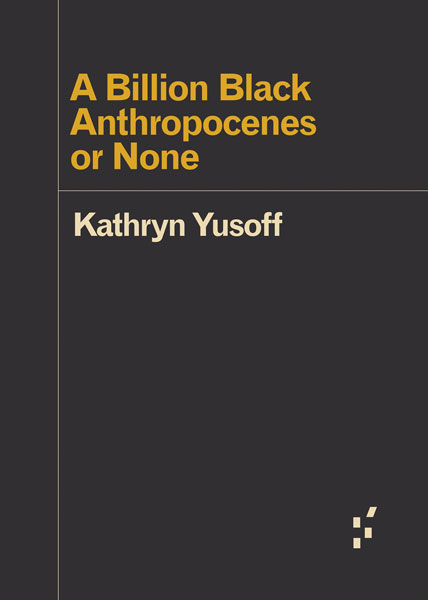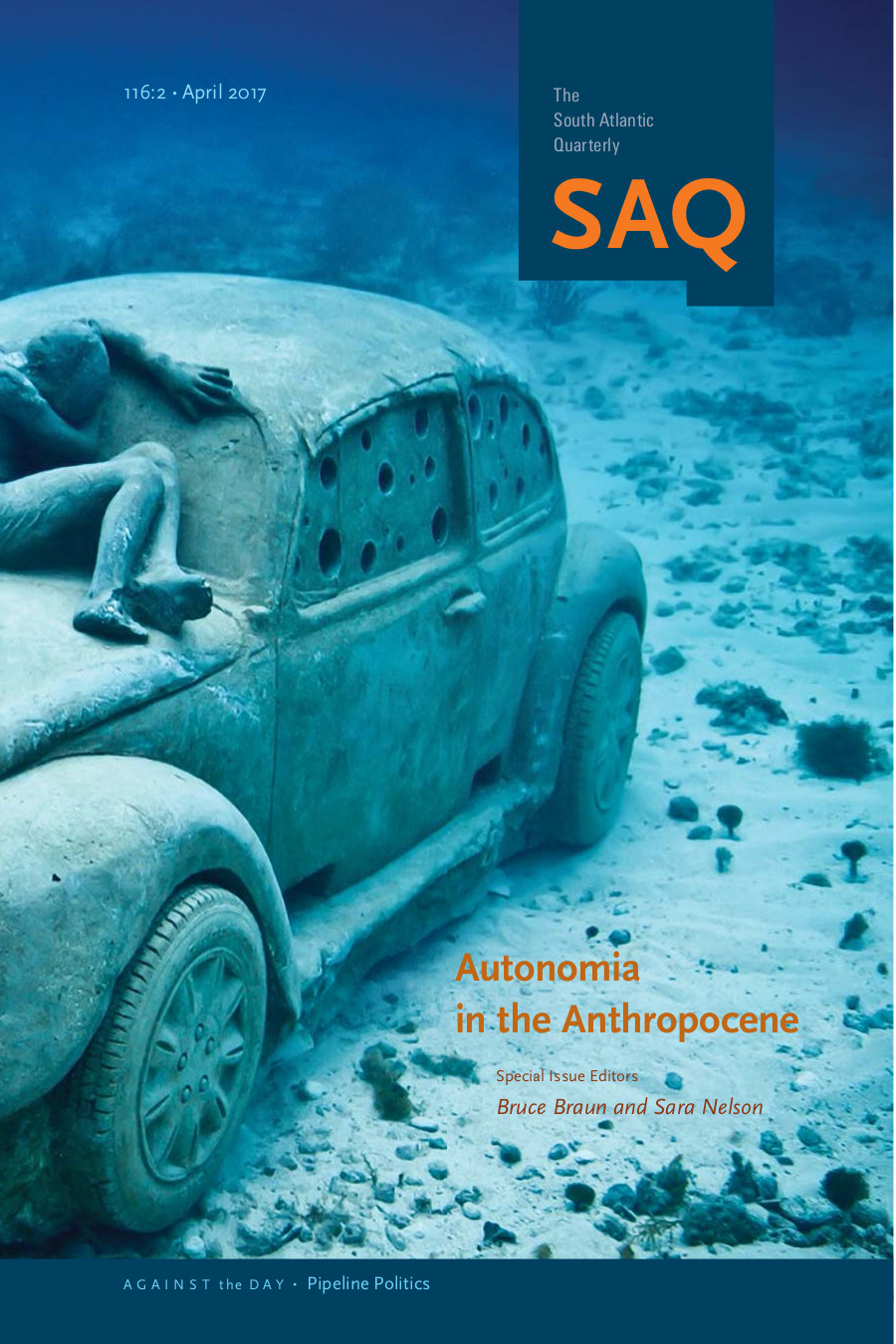Kathryn Yusoff: A Billion Black Anthropocenes or None (2018)
Filed under book | Tags: · anthropocene, black people, blackness, colonialism, critique, earth, earth system, geology, materiality, politics, race, slavery, theory

“No geology is neutral, writes Kathryn Yusoff. Tracing the color line of the Anthropocene, A Billion Black Anthropocenes or None examines how the grammar of geology is foundational to establishing the extractive economies of subjective life and the earth under colonialism and slavery. Yusoff initiates a transdisciplinary conversation between black feminist theory, geography, and the earth sciences, addressing the politics of the Anthropocene within the context of race, materiality, deep time, and the afterlives of geology.”
Publisher University of Minnesota Press, 2018
Forerunners series
ISBN 9781517907532, 1517907535
xiv+115 pages
Commentary: McKenzie Wark (Verso Blog, 2019).
Comment (0)Brian Holmes: Driving the Golden Spike: The Aesthetics of Anthropocene Public Space (2016)
Filed under pamphlet | Tags: · aesthetics, anthropocene, public space, theory

“The idea came to me, ironically, while driving around Chicago. It was high summer; I was on the city’s shattered West Side. The urban grid slid by outside the window, residential vernacular on its third or fourth recycle, parched and decayed, with a kind of lost and disjointed vibrancy. Eyes on the traffic, my mind rolled back over the city’s history: its canals and granaries and skyscrapers, its formidable industrial century since the arrival of the railroads in the 1850s, its suburban sprawl after the Great Fire of 1873, its postmodern decline made irreversible by the 1960s revolts and the capital flight that followed. Through it all, the university and financial sectors continued their endless rise. There is a profound violence to this place, but also a deep sense of regularity. Chicago is the race-riot city that turns civil strife into social norms, and splits atoms while abstracting material production into mathematical derivatives. Can you still experiment in a place that has successively been the transport hub, the stockyard, the workshop, the vitrine, the boxing-ring, and quite literally the laboratory of modernism? And what could this ideal of experimentation mean for our future, when its Promethean pasts have reappeared before our eyes as the new geological layer of the Anthropocene?” (opening paragraph)
Publisher Deep Time Chicago, September 2016
Creative Commons BY-ND 4.0 International License
19 pages
Video lecture (April 2016, 47 min)
Publisher
PDF, PDF
HTML (e-flux, Oct 2017)
South Atlantic Quarterly, 116(2): Autonomia in the Anthropocene (2017)
Filed under journal | Tags: · anthropocene, autonomy, capitalism, cognitive capitalism, commons, labour, marxism, multitude, subjectivity

“Despite Autonomia’s widespread influence on political action and post-Marxist scholarship, it has been surprisingly slow to address planetary change and environmental politics. With a focus on cognitive capitalism, many autonomist scholars have downplayed or fully ignored the ecological dimensions of post-Fordism—its foundations in extractive energy economies, its links to the accelerating financialization of nature under the banner of so-called green capitalism, its harnessing of nonhuman capacities, and its wildly uneven toxic geographies. This lack of engagement is regrettable given that, we propose, autonomist insights hold great promise for understanding both the transformed relation between capital and nonhuman natures in post-Fordism and the many political movements that have emerged in response. […]
It is no longer evident that key terms found in the autonomist lexicon—species being, the common, multitude, potentia—survive the challenge of the Anthropocene unchanged or that the production of subjectivity (a cornerstone of autonomist thought) can be understood solely in terms of language, habit, or gesture. It may therefore be necessary to think beyond the struggles of the factory floor, or those of the cognitariat today, to imagine and think from other sites of struggle, other forms of solidarity, and other experiments in “commoning.” These bring into play unfamiliar actors and unacknowledged geographies: sites of extraction and circuits of waste, indigenous communities and territories, rising seas and toxic landscapes that are materially present within the informationalized economies of global capitalism, but often invisible to those working within them. We might say, then, that the Anthropocene names autonomist Marxism’s unthought, an unthought that intrudes on its political imaginaries. What happens to autonomism if it begins to question the autonomy of the human? Or if it leaves its privileged sites in the global North?”
With contributions by Sara Nelson and Bruce Braun, Miriam Tola, Jason Read, Elizabeth R. Johnson, Elizabeth A. Povinelli, Matteo Pasquinelli, Karen Pinkus, Marco Armiero and Massimo De Angelis, Anja Kanngieser and Nicholas Beuret, and Isabelle Stengers.
Edited by Sara Nelson and Bruce Braun
Publisher Duke University Press, Apr 2017
ISSN 0038-2876
178 pages

